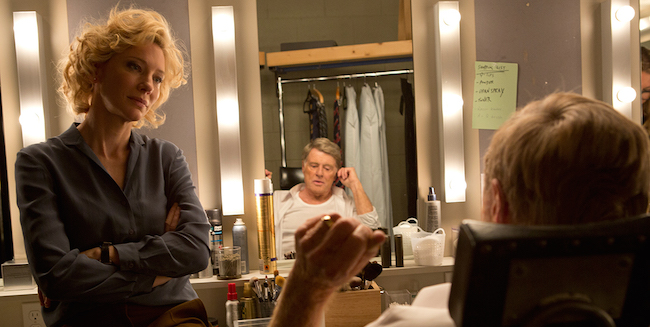First thing, despite the title of this piece, I don’t want to harp on this too much: But when Truth debuted at the Toronto International Film Festival on Saturday night, it’s a weird thing when the movie’s opening scenes make a huge deal about introducing Dan Rather –- a face we know very, very well — then all of a sudden Robert Redford walks on screen. Also a face we know very, very well. Redford is only five years younger than Rather and it’s just, well, odd to watch a currently incredibly famous person portray another currently incredibly famous person. To top it off, Redford was not in attendance, but Dan Rather was there … to watch the premiere of a movie about the incident that led to him losing the CBS Evening News anchor position. Here’s a guy who reported on President Kennedy being assassinated, but the one big movie about him presents his darkest moment. So, I guess it’s not too surprising that, in a post-screening Q&A, Rather broke out into tears.
Here’s the thing: If the 2004 story about George W. Bush’s Texas Air National Guard service interests you, you will probably like Truth. If you have a passing interest, in a, “Oh, yeah, I remember that,” kind of way, you will probably go into Truth expecting the film to at least have a point of view about what happened. But, the problem is, it really doesn’t. After watching, I know very little more now than I knew when this story imploded in 2004.
For a while there in 2004, it seemed George W. Bush might lose to John Kerry. If you remember, Kerry was getting killed with political campaign ads questioning his service in Vietnam, while Bush got off relatively scot-free, even though Bush never set foot in Vietnam – serving in the Texas Air National Guard instead. With some, as it turns out, nefarious tips, CBS News thought they had a scoop that would change the course of the election: that Bush used his father’s buddies to get him out of Vietnam, and that there were new uncovered documents to prove that Bush pretty much disappeared during his service.
The movie’s main character is Mary Mapes, played by Cate Blanchett, a then-producer for 60 Minutes. It’s Mapes who makes the decision to use these documents in the story even though (A) they came from a very untrustworthy source and (B) they in no way could be verified. Soon after the report airs, conservative bloggers point out that the documents, supposedly from the early 1970s, seem consistent with the format of Microsoft Word (which I am typing on right now) and not a typewriter from the 1970s.
The film wants Mapes to come off sympathetically, even though it’s impossible to hide how bad she messed up. She couldn’t get the documents verified, but she made the decision to run them anyway. Mapes (and the movie) try to make the point over and over that that the documents were such a small part of the full story about Bush’s Vietnam era record that it shouldn’t matter. Which I found laughable because (A) it IS a huge deal CBS published what might be forged documents and (B) in 21st century media, OF COURSE any mistake is going to be what anyone cares about.
And Truth tries to amp up the drama in weird and unnecessary places. There’s a scene where Mapes is reading Internet comments about herself (never read Internet comments) and she sees one that says something like, “I bet Hannity is sharpening his claws to gut this witch.” OK, not a nice comment at all. It’s pretty horrible! But it’s also pretty obvious that this Internet commenter doesn’t think Sean Hannity is literally going to cause Mapes physical harm. Yet, the movie zooms in on “gut this witch” and ominous music plays while Blanchett screams. In a movie that already has built-in tension, this seemed dishonest.
I really do wish Truth had something to say. Blanchett’s Mapes keeps asking people near the end, “You believe me, right?” That’s the problem with this movie, because it doesn’t seem to understand what the issue is. What are we trying to discover? The movie is asking if we believe Mapes, yet no one seems to be at all doubting Mapes’ words. This isn’t a question of, “Do I believe her or not?” It’s, “Did she air documents she shouldn’t have because they weren’t properly vetted?” No one thinks she personally forged these documents, the question is if she was careless. And when the answer is such an obvious, “Well, yes, of course in this one instance she was careless,” I couldn’t help but start wondering why there needed to be a movie about this at all.
In other words: if Truth had made a strong stance claiming the documents are real, well, then maybe we are on to something. (It doesn’t; Truth basically takes the shrug emoticon position of, “we have no idea!”) Instead, this is basically, “Person doesn’t think she messed up quite as bad as everyone else thinks she messed up.”
If nothing else: at least by the end of the movie I started to accept the fact that Dan Rather looks exactly like Robert Redford.
Mike Ryan has written for The Huffington Post, Wired, Vanity Fair and New York magazine. He is senior entertainment writer at Uproxx. You can contact him directly on Twitter.







